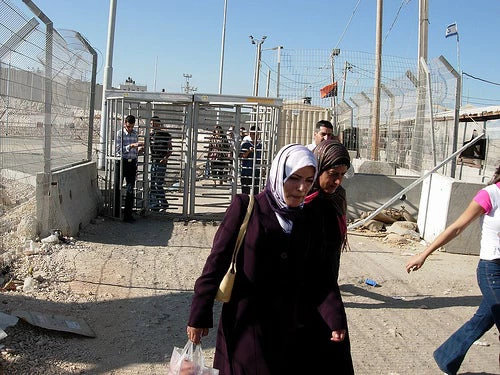
Since the end of the 1980s Israel has erected check-points and other barriers to mobility inside and across the borders in the West Bank and Gaza. While these barriers were put in place to increase security, they have also reduced firms’ ability to transport goods and affected the day-to-day lives of people commuting to work. The creation of check-points has had a significant negative effect on residents of the West Bank, lowering their employment prospects, wages and days worked per month. This effect is quite costly to the economy – equivalent to 6 percent of GDP in 2007.
By substantially increasing the costs of mobility, the check-points in the West Bank have an impact that is similar to that of inefficient borders or high trade and transportation costs. These check-points are easier to study than border delays, however. For one, they are well-documented, as is information about the population’s employment levels, wages, and working hours. In addition, because the changes in the check-points’ placement are more abrupt and frequent than improvements to infrastructure or border management, they provide a unique, quasi-natural experiment to test for the effects of variations in trade costs on economic welfare.
In September 2000, with the outbreak of the second Intifada, Israel began scaling up and enforcing a particularly severe system of mobility barriers – including permanent and partial check-points, roadblocks, earth mounds and barrier gates – restricting the movement of goods and people within and across the West Bank. At the check-points, Israeli security personnel often search vehicles and check the documentation of people in transit. In some cases, as in Nablus until 2009, these barriers impede any vehicular traffic in and out of cities and towns. The measures dramatically increase traveling time between cities, villages and rural areas, forcing vehicles to make costly detours.
We used data on these barriers, as well as labor force survey data, to identify the impacts of this system on the West Bank labor market in the period 2000-2009. Of all the barrier types, the check-points did the most harm to labor conditions. We found, for example, that placing just one check-point a minute away from a town reduced by half of a percentage point the probability of the town’s residents being employed. It reduced the residents’ hourly wage by 5.2 percent. We estimate that the presence of check-points caused approximately 6,900 more unemployed workers in 2007 in the West Bank. This translates into a monetary loss to the economy of approximately $38 million. If we also consider the impact of the check-points on hourly wages, the loss comes to $229 million, or approximately 6 percent of the West Bank GDP in 2007.
We capture only the short-term impact of these restrictions, so it is likely that their effects are even more substantial. Our results suggest that the check-points damage the economy more by increasing goods transport costs, rather than by reducing labor mobility. To the extent that the effect of removing a check-point is akin to that of improving infrastructure or border management, our results confirm the importance of reducing trade costs for improving welfare. As this study shows, that is particularly the case in conflict and post-conflict countries, where such trade costs are highest and delay much-needed economic recovery.



Join the Conversation